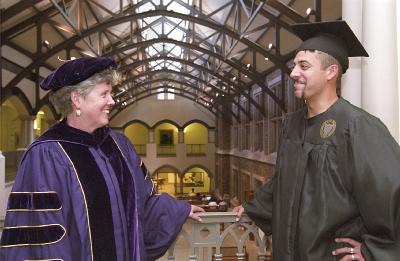June 3, 2004
Marshaling Pride: Academic parents have unique chance to watch their kids take big step
Kim Johnson Bogart has good reasons both professional and personal to attend and enjoy the University of Washington’s 2004 Commencement Exercises on Saturday, June 12. She has attended several times before, but this year, it’s a family thing.
In the first place, Bogart is an assistant dean for undergraduate education at the UW — which is reason enough to attend the annual ceremonies. Second, she will continue this year serving as a marshal at Husky Stadium, helping things to run smoothly on the day when, as she says, “all the birds fly into the world.”
The marshals are those hard-working volunteers stationed throughout the stadium who help oversee the movement and seating of the thousands of graduating students on commencement day. They’re like super-ushers decked out in academic regalia, and this is Bogart’s fifth year of such service. She said she loves the bustle of commencement. “All those lives! It’s huge! And they’re all going off to whatever the next dream is.”
But this year’s marshaling duties will be made all the sweeter for Bogart because one of those “birds” leaving the nest will be her own son, Gabe Fahoum, who has earned his bachelor’s degree in the Comparative History of Ideas (CHID) program. Fahoum, 29, said he was not at first planning to attend the commencement exercises, but changed his mind when his mother asked nicely.
“I didn’t want to sit for five hours for you,” he joked as mother and son chatted on a recent afternoon in Bogart’s office, “but I’m sure you sat for five hours for me at some time.” She laughed and admitted that was probably true.
Bogart is one of three marshals this year who will have the pleasure of helping in their own child’s commencement exercises. Charles Nittrouer, a professor in the School of Oceanography and the Department of Earth and space sciences, will watch his daughter, Christina, walk forth with a bachelor’s degree in drama. And Thuy Vu, an assistant professor in the department of American Ethnic Studies, will proudly watch his son, Leyen, make official his bachelor’s degree in zoology.
Sara Griggs, UW director of commencement, said of Bogart, Nittrouer, Vu and the other dedicated marshals, “To me, they are the unsung heroes of commencement. They are like the postman — they’re there rain, shine, ensuring students leave with a fitting tribute.What a commitment that is, and what a great statement about their love for their profession and the students.”
Fahoum, Bogart’s son, graduated from high school in 1993 and took a few years away from education before returning in 1998 to finish his undergraduate degree. Bogart said his path and her own, too — she returned to school and earned her advanced degrees when she was a young parent — have taught her that not everyone is right for the traditional, unbroken K-20 route from kindergarten through college.
“When Gabe first came to me and said (of college) ‘I’m not ready to do that,’ it was a little scary for me,” Bogart said. “But there was something about the way he talked that made me realize he knew what he was talking about, and that I had to trust that.”
She said she has since met others who took breaks before or during their college career and returned to school more mature and ready to learn than before. “I don’t want to diminish the experience of others, but an awful lot of people didn’t come here direct from high school,” she said. “And I have come to realize the value of that.”
For Fahoum, the few years away from college meant work at local record stores, some creative writing and a lot of self-directed reading — some of it decidedly collegiate in nature.
“He had started to read Nietzsche and Henry Miller, and he came to me and wanted to have these conversations about Nietzsche,” she said, glancing at him with a smile. Bogart deemed that a good moment to gently nudge her son back toward school, tongue in cheek: “I said, ‘It might be best if you had a group of people who were reading Nietzsche all at the same time, kind of like — a class?’”
Fahoum agreed to head for college: “It was like, OK, I’ve had fun playing. Work had become routine,” he said. He enjoyed school, and finding the Comparative History of Ideas program made him feel especially at home.
“I love it,” Fahoum said. “It enables me to become more of who I am.”
His mother added, “Which is what this place is all about.”
So Kim Johnson Bogart’s personal and professional reasons for being at commencement overlap a little here and there. But then, so do many people’s reasons for seeking higher education, no matter the school or department.
“It’s a claiming of yourself, and the responsibility that comes with that,” Bogart said. “What it does is show that people learn on their own. The ‘U’ is here to serve that and feed it and help it — but the people who come here don’t come empty.”



